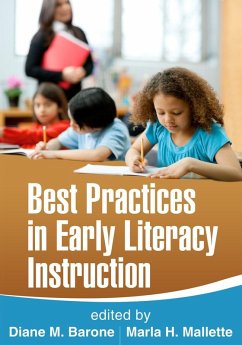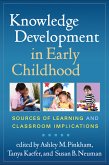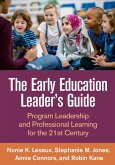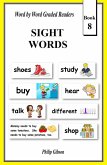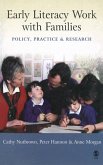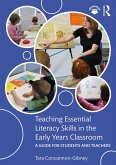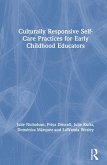Best Practices in Early Literacy Instruction (eBook, ePUB)
Redaktion: Barone, Diane M.; Mallette, Marla H.
34,95 €
34,95 €
inkl. MwSt.
Sofort per Download lieferbar

17 °P sammeln
34,95 €
Als Download kaufen

34,95 €
inkl. MwSt.
Sofort per Download lieferbar

17 °P sammeln
Jetzt verschenken
Alle Infos zum eBook verschenken
34,95 €
inkl. MwSt.
Sofort per Download lieferbar
Alle Infos zum eBook verschenken

17 °P sammeln
Best Practices in Early Literacy Instruction (eBook, ePUB)
Redaktion: Barone, Diane M.; Mallette, Marla H.
- Format: ePub
- Merkliste
- Auf die Merkliste
- Bewerten Bewerten
- Teilen
- Produkt teilen
- Produkterinnerung
- Produkterinnerung

Bitte loggen Sie sich zunächst in Ihr Kundenkonto ein oder registrieren Sie sich bei
bücher.de, um das eBook-Abo tolino select nutzen zu können.
Hier können Sie sich einloggen
Hier können Sie sich einloggen
Sie sind bereits eingeloggt. Klicken Sie auf 2. tolino select Abo, um fortzufahren.

Bitte loggen Sie sich zunächst in Ihr Kundenkonto ein oder registrieren Sie sich bei bücher.de, um das eBook-Abo tolino select nutzen zu können.
Bringing together prominent scholars, this book shows how 21st-century research and theory can inform everyday instructional practices in early childhood classrooms (PreK-3). Coverage includes foundational topics such as alphabet learning, phonological awareness, oral language development, and learning to write, as well as cutting-edge topics such as digital literacy, informational texts, and response to intervention. Every chapter features guiding questions; an overview of ideas and findings on the topic at hand; specific suggestions for improving instruction, assessment, and/or the…mehr
- Geräte: eReader
- ohne Kopierschutz
- eBook Hilfe
Andere Kunden interessierten sich auch für
![Knowledge Development in Early Childhood (eBook, ePUB) Knowledge Development in Early Childhood (eBook, ePUB)]() Knowledge Development in Early Childhood (eBook, ePUB)34,95 €
Knowledge Development in Early Childhood (eBook, ePUB)34,95 €![The Early Education Leader's Guide (eBook, ePUB) The Early Education Leader's Guide (eBook, ePUB)]() Nonie K. LesauxThe Early Education Leader's Guide (eBook, ePUB)26,95 €
Nonie K. LesauxThe Early Education Leader's Guide (eBook, ePUB)26,95 €![Sight Words: Book 8 (Learn The Sight Words, #8) (eBook, ePUB) Sight Words: Book 8 (Learn The Sight Words, #8) (eBook, ePUB)]() Philip GibsonSight Words: Book 8 (Learn The Sight Words, #8) (eBook, ePUB)4,49 €
Philip GibsonSight Words: Book 8 (Learn The Sight Words, #8) (eBook, ePUB)4,49 €![Early Literacy Work with Families (eBook, ePUB) Early Literacy Work with Families (eBook, ePUB)]() Cathy NutbrownEarly Literacy Work with Families (eBook, ePUB)40,95 €
Cathy NutbrownEarly Literacy Work with Families (eBook, ePUB)40,95 €![Teaching Essential Literacy Skills in the Early Years Classroom (eBook, ePUB) Teaching Essential Literacy Skills in the Early Years Classroom (eBook, ePUB)]() Tara Concannon-GibneyTeaching Essential Literacy Skills in the Early Years Classroom (eBook, ePUB)36,95 €
Tara Concannon-GibneyTeaching Essential Literacy Skills in the Early Years Classroom (eBook, ePUB)36,95 €![Simple is Easy (eBook, ePUB) Simple is Easy (eBook, ePUB)]() H. RichSimple is Easy (eBook, ePUB)5,99 €
H. RichSimple is Easy (eBook, ePUB)5,99 €![Culturally Responsive Self-Care Practices for Early Childhood Educators (eBook, ePUB) Culturally Responsive Self-Care Practices for Early Childhood Educators (eBook, ePUB)]() Julie NicholsonCulturally Responsive Self-Care Practices for Early Childhood Educators (eBook, ePUB)29,95 €
Julie NicholsonCulturally Responsive Self-Care Practices for Early Childhood Educators (eBook, ePUB)29,95 €-
-
-
Bringing together prominent scholars, this book shows how 21st-century research and theory can inform everyday instructional practices in early childhood classrooms (PreK-3). Coverage includes foundational topics such as alphabet learning, phonological awareness, oral language development, and learning to write, as well as cutting-edge topics such as digital literacy, informational texts, and response to intervention. Every chapter features guiding questions; an overview of ideas and findings on the topic at hand; specific suggestions for improving instruction, assessment, and/or the classroom environment; and an engrossing example of the practices in action.
Dieser Download kann aus rechtlichen Gründen nur mit Rechnungsadresse in A, D ausgeliefert werden.
Produktdetails
- Produktdetails
- Verlag: Guilford Publications
- Seitenzahl: 334
- Erscheinungstermin: 4. September 2013
- Englisch
- ISBN-13: 9781462511778
- Artikelnr.: 47978540
- Verlag: Guilford Publications
- Seitenzahl: 334
- Erscheinungstermin: 4. September 2013
- Englisch
- ISBN-13: 9781462511778
- Artikelnr.: 47978540
- Herstellerkennzeichnung Die Herstellerinformationen sind derzeit nicht verfügbar.
Diane M. Barone, EdD, is Foundation Professor of Literacy Studies at the University of Nevada, Reno. Her research focuses on young children's literacy development and instruction in high-poverty schools. Dr. Barone served as the editor of Reading Research Quarterly and was a board member of the International Reading Association and the National Reading Conference. She is coeditor of The Reading Teacher with Marla H. Mallette. Marla H. Mallette, PhD, is Associate Professor of Literacy Education at Binghamton University. Her research interests include literacy instruction and learning with students of culturally and linguistically diverse backgrounds, and early literacy. She is also interested in literacy research methodologies and has used various methodologies in her own work. Dr. Mallette is coeditor of The Reading Teacher with Diane M. Barone. Â
I. Influences on Literacy Development
1. Parent Involvement Supporting Early Literacy Achievement: Best Practices
for Bridging the Home and School Environments, Beth M. Phillips, Kylie S.
Flynn, Galiya A. Tabulda, Smriti Jangra, and Christopher J. Lonigan
2. A Comprehensive Approach to Building Oral Language in Preschool:
Prerequisites for Literacy, Allyssa McCabe
3. Working with Culturally and Linguistically Diverse Students: Lessons
Learned from Reading Recovery, Catherine Compton-Lilly
4. Supporting Language and Literacy Development in Quality Preschools,
Shannon Riley-Ayers
II. Materials and Texts
5. Early Literacy Development in the Digital Age, Jackie Marsh and Dylan
Yamada-Rice
6. What, When, and How Electronic Media Can Be Used in an Early Literacy
Classroom, Annie M. Moses
7. New Perspectives on Literature for Young Children, Diane M. Barone and
Andrea Morency
8. Read All about I.T.!: Informational Text in the Early Childhood
Classroom, Lynne M. Watanabe and Nell K. Duke
III. Reconceptualizing Developmentally Appropriate Practice
9. Phonological Awareness and Alphabet Knowledge: The Foundations of Early
Reading, Marcia Invernizzi and Laura S. Tortorelli
10. Reading to Learn from the Beginning: Comprehension Instruction in the
Primary Grades, Katherine A. Dougherty Stahl
11. Best Practices in Oral Vocabulary Instruction, Susan B. Neuman and
Tanya S. Wright
12. Real Books, Real Reading: Effective Fluency Instruction for Striving
Readers, Melanie R. Kuhn, Kristina Zukauskas Phelan, and Paula J.
Schwanenflugel
13. Best Practices in Early Writing Instruction, Deborah Wells Rowe and
Tanya R. Flushman
14. Strengthening Play in Early Literacy Teaching Practice, Kathleen A.
Roskos and James Christie
IV. Intervention and Assessment
15. "How Am I Doing?": Students' Perceptions of Literacy and Themselves,
Marla H. Mallette, Peter P. Afflerbach, and Christine E. Wiggs
16. The Interactive Strategies Approach to Early Literacy Intervention,
Donna M. Scanlon, Kimberly L. Anderson, and Frank R. Vellutino
17. An Evidence-Based Approach to Response to Intervention, Monica T.
Billen and Richard L. Allington
1. Parent Involvement Supporting Early Literacy Achievement: Best Practices
for Bridging the Home and School Environments, Beth M. Phillips, Kylie S.
Flynn, Galiya A. Tabulda, Smriti Jangra, and Christopher J. Lonigan
2. A Comprehensive Approach to Building Oral Language in Preschool:
Prerequisites for Literacy, Allyssa McCabe
3. Working with Culturally and Linguistically Diverse Students: Lessons
Learned from Reading Recovery, Catherine Compton-Lilly
4. Supporting Language and Literacy Development in Quality Preschools,
Shannon Riley-Ayers
II. Materials and Texts
5. Early Literacy Development in the Digital Age, Jackie Marsh and Dylan
Yamada-Rice
6. What, When, and How Electronic Media Can Be Used in an Early Literacy
Classroom, Annie M. Moses
7. New Perspectives on Literature for Young Children, Diane M. Barone and
Andrea Morency
8. Read All about I.T.!: Informational Text in the Early Childhood
Classroom, Lynne M. Watanabe and Nell K. Duke
III. Reconceptualizing Developmentally Appropriate Practice
9. Phonological Awareness and Alphabet Knowledge: The Foundations of Early
Reading, Marcia Invernizzi and Laura S. Tortorelli
10. Reading to Learn from the Beginning: Comprehension Instruction in the
Primary Grades, Katherine A. Dougherty Stahl
11. Best Practices in Oral Vocabulary Instruction, Susan B. Neuman and
Tanya S. Wright
12. Real Books, Real Reading: Effective Fluency Instruction for Striving
Readers, Melanie R. Kuhn, Kristina Zukauskas Phelan, and Paula J.
Schwanenflugel
13. Best Practices in Early Writing Instruction, Deborah Wells Rowe and
Tanya R. Flushman
14. Strengthening Play in Early Literacy Teaching Practice, Kathleen A.
Roskos and James Christie
IV. Intervention and Assessment
15. "How Am I Doing?": Students' Perceptions of Literacy and Themselves,
Marla H. Mallette, Peter P. Afflerbach, and Christine E. Wiggs
16. The Interactive Strategies Approach to Early Literacy Intervention,
Donna M. Scanlon, Kimberly L. Anderson, and Frank R. Vellutino
17. An Evidence-Based Approach to Response to Intervention, Monica T.
Billen and Richard L. Allington
I. Influences on Literacy Development
1. Parent Involvement Supporting Early Literacy Achievement: Best Practices
for Bridging the Home and School Environments, Beth M. Phillips, Kylie S.
Flynn, Galiya A. Tabulda, Smriti Jangra, and Christopher J. Lonigan
2. A Comprehensive Approach to Building Oral Language in Preschool:
Prerequisites for Literacy, Allyssa McCabe
3. Working with Culturally and Linguistically Diverse Students: Lessons
Learned from Reading Recovery, Catherine Compton-Lilly
4. Supporting Language and Literacy Development in Quality Preschools,
Shannon Riley-Ayers
II. Materials and Texts
5. Early Literacy Development in the Digital Age, Jackie Marsh and Dylan
Yamada-Rice
6. What, When, and How Electronic Media Can Be Used in an Early Literacy
Classroom, Annie M. Moses
7. New Perspectives on Literature for Young Children, Diane M. Barone and
Andrea Morency
8. Read All about I.T.!: Informational Text in the Early Childhood
Classroom, Lynne M. Watanabe and Nell K. Duke
III. Reconceptualizing Developmentally Appropriate Practice
9. Phonological Awareness and Alphabet Knowledge: The Foundations of Early
Reading, Marcia Invernizzi and Laura S. Tortorelli
10. Reading to Learn from the Beginning: Comprehension Instruction in the
Primary Grades, Katherine A. Dougherty Stahl
11. Best Practices in Oral Vocabulary Instruction, Susan B. Neuman and
Tanya S. Wright
12. Real Books, Real Reading: Effective Fluency Instruction for Striving
Readers, Melanie R. Kuhn, Kristina Zukauskas Phelan, and Paula J.
Schwanenflugel
13. Best Practices in Early Writing Instruction, Deborah Wells Rowe and
Tanya R. Flushman
14. Strengthening Play in Early Literacy Teaching Practice, Kathleen A.
Roskos and James Christie
IV. Intervention and Assessment
15. "How Am I Doing?": Students' Perceptions of Literacy and Themselves,
Marla H. Mallette, Peter P. Afflerbach, and Christine E. Wiggs
16. The Interactive Strategies Approach to Early Literacy Intervention,
Donna M. Scanlon, Kimberly L. Anderson, and Frank R. Vellutino
17. An Evidence-Based Approach to Response to Intervention, Monica T.
Billen and Richard L. Allington
1. Parent Involvement Supporting Early Literacy Achievement: Best Practices
for Bridging the Home and School Environments, Beth M. Phillips, Kylie S.
Flynn, Galiya A. Tabulda, Smriti Jangra, and Christopher J. Lonigan
2. A Comprehensive Approach to Building Oral Language in Preschool:
Prerequisites for Literacy, Allyssa McCabe
3. Working with Culturally and Linguistically Diverse Students: Lessons
Learned from Reading Recovery, Catherine Compton-Lilly
4. Supporting Language and Literacy Development in Quality Preschools,
Shannon Riley-Ayers
II. Materials and Texts
5. Early Literacy Development in the Digital Age, Jackie Marsh and Dylan
Yamada-Rice
6. What, When, and How Electronic Media Can Be Used in an Early Literacy
Classroom, Annie M. Moses
7. New Perspectives on Literature for Young Children, Diane M. Barone and
Andrea Morency
8. Read All about I.T.!: Informational Text in the Early Childhood
Classroom, Lynne M. Watanabe and Nell K. Duke
III. Reconceptualizing Developmentally Appropriate Practice
9. Phonological Awareness and Alphabet Knowledge: The Foundations of Early
Reading, Marcia Invernizzi and Laura S. Tortorelli
10. Reading to Learn from the Beginning: Comprehension Instruction in the
Primary Grades, Katherine A. Dougherty Stahl
11. Best Practices in Oral Vocabulary Instruction, Susan B. Neuman and
Tanya S. Wright
12. Real Books, Real Reading: Effective Fluency Instruction for Striving
Readers, Melanie R. Kuhn, Kristina Zukauskas Phelan, and Paula J.
Schwanenflugel
13. Best Practices in Early Writing Instruction, Deborah Wells Rowe and
Tanya R. Flushman
14. Strengthening Play in Early Literacy Teaching Practice, Kathleen A.
Roskos and James Christie
IV. Intervention and Assessment
15. "How Am I Doing?": Students' Perceptions of Literacy and Themselves,
Marla H. Mallette, Peter P. Afflerbach, and Christine E. Wiggs
16. The Interactive Strategies Approach to Early Literacy Intervention,
Donna M. Scanlon, Kimberly L. Anderson, and Frank R. Vellutino
17. An Evidence-Based Approach to Response to Intervention, Monica T.
Billen and Richard L. Allington
